- Home
- Connie Shelton
The Woodcarver's Secret (Samantha Sweet Mysteries) Page 2
The Woodcarver's Secret (Samantha Sweet Mysteries) Read online
Page 2
John stepped closer and looked at the hinge Tyrel had finished, the first of four.
“It should have a lid,” he mused, picking up the large hinge and studying it. He set it back. “First things first. Better get back to it. Tomorrow is market day—I’ll see you then.”
He hurried off without another word.
“Odd one, that Carver,” said a man who had bumped shoulders with John as he rushed away. “They say he’s become even stranger since the day of the lightning strike.”
Tyrel felt a jab of guilt. Had his careless comment in front of Maggie started a raft of rumors through the town?
“Last market day,” the man continued, “my wife wanted to buy two plates. The man would barely speak to her. Sat there under his measly awning, carving away at some square thing, like a moody artist. I say artistic genius is one thing, but in this town a man’s not going to make his living from that foolishness. He’d better be selling useful things to his regular customers.”
A square item. So, John Carver must indeed be working on the wooden box he’d mentioned to Tyrel as they carried the broken tree parts down the hill.
“Don’t understand it, myself,” the man said. “Carver always seemed personable, friendly.”
“Maybe it was just a mood that day.”
“Moods—ha! Got no use for no la-di-da moods. Sell me a pair of horseshoes, would you, Smith?”
Tyrel busied himself with fitting and shoeing the man’s horse, putting aside his concerns about the change in John Carver. A personality changed by a lightning strike? It seemed preposterous. Most likely it was exactly what John had hinted at—his wife was about to present him with a fifth child and was giving him hell about bringing in more money. He got an idea.
* * *
John put the last of his finished wares into the small handcart and bent over to lift the yoke. Once it began rolling, the burden moved along easily enough. Maggie had asked that he bring bread, vegetables and candles when he came home. She made a point about the candles—he’d been burning far too many of them, working late into the night in his shop at the side of the house. Making matters worse, her brother Sean added to the discussion by disparaging the work of an artist, saying John should instead do something useful with his time, helping out on the plot of farm land.
He put his brother-in-law’s comments aside and turned to wave at his wife, feeling a rush of emotion at the sight of the thin woman, hugely pregnant now, with little Siobhan perched on her hip and the next two hanging on to her skirts. Her old smile briefly lit her face, bringing back memories of their courting days. Ethan had begged to come with his father, but the six-year-old didn’t yet have the stamina to make it through the long market day without becoming tired and whiny. Maggie was a good mother and an excellent cook, given what she had to work with. It was no wonder her temper ran a little short these days. He turned to the rutted road that led the half-mile to the side gate of the town wall, hurrying, as he was already getting a late start.
At the gate a stream of patrons were making their way toward the open square where tables and blankets were spread with food and wares. A butcher displayed cages of chickens, squawking wildly, and sides of meat. Someone else showed piles of dirt-crusted potatoes and carrots; one woman’s table was laden with lengths of cloth. The women who paused there looked longingly at the pieces dyed in reds and blues, but purchased the plainer tans and grays which must have been less expensive. An old man under a wooden shelter hammered at a strip of tin, forming the handle for a teapot.
John hurried to his customary spot. Pushing his cart up against the wall of a two-story stone building, he whipped out two blankets and began setting out his display of plates and kitchen implements. A section of tree stump made a stool, and his box of chisels afforded him the ability to work when he wasn’t waiting on a customer. He looked at the sky. Clear, for a change. If the clouds began to threaten rain, he would need to get out the poles and tarpaulin of oiled cloth and erect a shelter over his work area.
His interest quickened as he came to the cloth-wrapped packet that held the wooden box he’d begun making two weeks ago. From the smaller of the two lengths of alder branch he’d blocked out the rough shape of the piece with his hatchet—a rectangle about two hands in length and one hand wide. The depth would be sufficient for a lady to store her bits of finery; a man might use it for his pipe; an important courier could use it for the safe keeping of letters. Perhaps one day a letter to the king would be carried all the way to London in this very box!
He set the parcel on the open end of the cart, the place that afforded a reasonably stable surface for working, then dragged the stump-seat near to it. Peeling back the cloth covering, he felt a moment’s disappointment.
In his mind, the lidded box was a fine, polished piece, worthy of that letter to the king. But in reality the carved quilt pattern had not turned out as well as he had hoped. He had made the mistake of applying a stain to the entire piece without testing a small bit first. The walnut oil was too dark in places where it had run into the deeply carved grooves, and he had been interrupted by the children before he could properly wipe it down and distribute the color more evenly. It would be difficult to rework it at this point, but he felt he could do it.
John became aware of someone standing nearby.
“Good market day,” Tyrel said.
John looked around. No one had stopped to examine his wares yet, so he could not quite agree with the statement, but he gave his friend a smile anyway.
“What’s this?” Tyrel was eyeing the unfinished box.
John wanted to flip the covering over it once more, but Tyrel had already seen it.
“It isn’t finished,” he said.
“Ah, yes. You mentioned some hinges for it.” Tyrel reached into his pocket and drew out two small bits of metal. “A gift. I felt badly for the way my mouth ran off that day.”
John had long since forgiven Tyrel’s mentioning the lightning to Maggie. He looked at the metal pieces. The hinges were of fine quality, working smoothly, and just the right size for the box.
“Now that I see it, I’m thinking a clasp to latch it closed would be nice too,” the blacksmith said. He held his fingers up to the place where box and lid came together, measuring. “I shall come back by the end of day, provided the demand for wheels and tools isn’t too great.”
John started to protest that he had no money for metalwork, but the smith had rushed away and two women approached his display. He diverted his attention to make the sale, pocketing the small coins the younger woman gave for two of the plates. The money would provide enough for a half-dozen new candles, the tall ones. He stretched his fingers, working them to get rid of the residual tingling that still often plagued him, and sat down to mount the new hinges to the box.
Shouts and a clatter of hooves grabbed his attention. Two boys, no more than twelve years old, ran through the market square and ducked into a narrow alley before reaching John’s place. Rounding the bend in the High Street, came a dark horse. The rider wore the livery of the Sheriff.
“Where did they go?” the man demanded from the great height of his saddle, staring down at the shoppers in the street. “Those two thieves! Where did they go?”
John lowered his gaze and studiously worked at his hinges. When the sheriff’s man pulled his horse up in front of John, he glanced up disinterestedly and shrugged. The man rode on.
He supposed that if the thievery had happened with his own wares he would have welcomed the sheriff’s intervention, but he doubted this was the case. More likely, one of the wealthy ladies was missing a small trinket and had reported the two lads as culprits. Or, they were simply taking something to eat—a loaf of bread or piece of cheese. They’d looked hungry enough.
This current sheriff—the baron’s newest appointment—had won no friends here, cultivating a climate of distrust and practically forcing people to cheat when he imposed dozens of onerous taxes at the time he took office two years ago.
This deputy would find no one in Galway willing to turn in two young boys who only needed food. John watched the black horse disappear around a bend in the road as he picked up his smallest chisel and worked to smooth the rough edges of the box.
The sun was low in the sky by the time John looked up from his work. A few customers had put some coins into his pocket but he’d spent the majority of his day adding small touches to the wooden box, realizing that it would never become the beautiful piece of craftsmanship he had imagined. He still had several pieces of wood at home, however, and rather than feeling discouraged he was looking forward to attempting another.
His cart loaded, he remembered Maggie’s requests and rushed along to the remaining vendors, finding their stocks depleted. The baker had only one loaf and since it was a little moldy on one side, gave it to John at no charge; the supply of vegetables was reduced to a small pile of potatoes, rejected ones with bruises. Maggie’s favorite gardener who raised herbs had also departed. It said something of his good fortune, he decided, that the candle maker had a nice supply. He spent the majority of his coins there, tucking the heavy wax sticks deeply in among his tools.
A shout caught his attention as he picked up the cart’s handle, turning toward home.
“You! I’ve one last chicken,” called the poultry woman.
He pulled up short beside the stack of empty cages.
“You’re John Carver, aren’t you? I noticed you trying to round up some food.” She nodded toward the lone hen. “She was not my largest but maybe she’ll provide the children with something.”
John felt his face redden. Was this the new rumor about the village, that his children were going hungry? He started to decline her charity.
“It’ll be ten pence,” the woman said.
He reached into his coin pocket and discovered that ten was all he had. He tossed it to her. She expertly grabbed the chicken and wrung its neck in one quick move.
“There. All ready for tonight’s supper.” She stacked the empty cage onto her hand-truck and started off in the opposite direction.
John fumed, wanting to shout something about how his children ate quite well, thank you very much, but what would be the point? At least now he had a decent meal to soothe Maggie’s likely complaint about how much he’d spent on candles.
His legs ached as he pulled the cart home, the rising moon lighting the double track by the time he caught sight of the cottage. He stopped beside the lean-to workshop and secured the tarpaulin against a possible night rain before picking up the dead chicken and small net bag of potatoes.
Inside, smoke rose to the peak of the thatched roof, a little of it wafting out the hole at the top, most of it filling the room. Maggie stirred a pot that smelled like boiled cabbage, balancing the eighteen-month-old baby on her hip and ignoring the pitiful whines of the next two. Her brother sat on the bench against the wall, scraping thick mud from his boots, making no move to help. She brightened slightly when she saw the chicken, but her brows knitted together in worry only a moment later. John followed her gaze.
On the floor in the corner young Ethan lay on his straw pallet, his eyes closed. John started to tease his oldest son for being lazy but noticed that the boy’s face was unnaturally red, his breathing shallow.
“He’s taken worse and worse all day,” Maggie said, leaving the cookpot long enough to take the new food from John and set it on her work table.
He marveled at how she handled it all one-handed and kept the toddler under control with the other, and he wondered how she would manage once the new infant came. Soon, Ethan would be strong enough to lend a hand. But a second glance told him the six-year-old was not doing well.
“What’s the matter with him?” he asked.
“Fever, and now he’s got some spots on his skin.”
“Better not be bringing the Black Death in upon us,” Sean piped up from his corner.
John felt his stomach tighten. Surely, here in this little village ... even in town, a half mile away ... surely, the dreaded plague had not come this close. He rushed to the bedside and knelt down. Ethan’s skin was hot and dry to the touch.
“He’s burning up! Why haven’t ye done anything?”
Maggie’s face tightened. How much could one woman cope with, he supposed. He found a scrap of cloth lying beside his son’s head.
“It’s slipped off,” Maggie said. “Dampen it with cold water. Try to cool him.”
John dipped the rag into a crock of stream water they kept beside the door and returned to dab at the boy’s face. Ethan barely responded. Meanwhile, the others began to wail and Maggie ordered them to the table where she set out bowls of cabbage soup. Sean joined them, John noticed, while Maggie tended the baby and he continued to press the wet cloth to Ethan’s face.
“I’d best bring in the animals,” Sean said a few minutes later, wiping his mouth after he stuffed in a sizeable chunk of bread. “We’ll have milk for the little ones soon.” He walked out into the moonlight.
“Every time I get ready to give him a piece of my mind, he does something like that,” Maggie said, “offering the first milk to the children.”
Unless John wanted to start farming, himself, and get his family into their own cottage, he would have to live with Sean—his unhelpfulness and his moods. And the truth was, right now there were no new tenancies available. Unless the baron opened up new lands, their lot in life was set.
He went outside to dampen the cloth again and when he came in Maggie took it and made him take her place at the table, setting out the last bowl of soup for him. She placed the cool cloth on Ethan’s forehead before turning to the others, washing their faces and hands and telling them to go use the privy one last time before bed.
In the adjoining room, John heard the sounds of the two goats bleating as Sean penned them into their corner, followed by the crisp sound of milk from the cow hitting the bottom of a wooden pail. Maggie spread two more straw pallets on the floor and shook out blankets. She dipped warm milk from the bucket and gave the three- and four-year-old each a small cup before settling them onto their beds. Sean had climbed the ladder to the small half-loft above the room, and they could hear him groaning as he settled himself for the night.
“You rest,” John told his wife, nodding toward the only real bed in the house, the wooden frame standing against the far wall. “I shall sit up with Ethan and watch him.”
“Wake me if he gets worse. I can walk to Mrs. O’Sullivan’s for some herbs.”
“You’ll do no walking about in the dark,” he told her, placing a kiss on her forehead. She smelled of sweat and smoke from the peat fire, but then everyone did. “I can go for help if we need it.”
Even among the two-dozen similar cottages clustered together in what was known as the village, there was always a woman who specialized in cures. She would be the same one who would come when Maggie knew the new baby was arriving. The nearest real doctor lived in town but it cost money to bring him out and, aside from drawing blood from the sick child, John doubted the man knew any more than Mrs. O’Sullivan about making their Ethan well. He knelt again beside the boy and felt his face—not a bit cooler. He found a second cloth and wet it from the cool water in a bowl, switching it with the overheated one.
Settling himself against the wall near the child’s head, John dozed then woke. He replaced the cloth again and found himself more alert now. He thought of the wooden box he had worked on all day. With the hinges, it seemed a nicer piece, more finished. He rose quietly and went out to the cart where he pulled it from under the tarp.
The design consisted of diagonal cuts at ninety-degree angles to each other resulting in a quilted look. The high points between the X-shaped intersections rose in soft pillowy curves. At the bottom he had smoothed a border around the base, and at the edge of the lid he’d made a precise row of small raised dots, like beadwork carved of wood. In the moonlight the piece was nearly beautiful, the uneven effects of the ill-chosen stain adding depth now. He smile
d and opened the lid.
He would smooth the inside a bit more and perhaps add a fine cloth lining if he could get the right material. He ran his index finger around the inner edges of it, starting in the upper corner and moving down and around, feeling for any small unevenness. When his finger completed the circuit of all four sides, a jolt shot through his hand, up the arm to the elbow, and into his body. Blinded and dizzy, he fell to his knees, dropping the box on the ground.
* * *
His breath came in short bursts; panting, John sat up. He held his head in his hands for a minute or more, willing the dizziness away. What in the Lord’s name had happened just now? How much time had passed? He blinked and dared a glance at the moon. It had not moved, so he’d not been out very long. He rubbed his hands down the sides of his face and flexed his fingers. The tingling that had intermittently plagued him since the day of the lightning incident was gone.
He stood. The pain in his legs had vanished.
His arms. They no longer ached.
He looked around at the other cottages in the village. No lights showed under doorways, no human shadow appeared in the moonlit meadows. He prayed no one had witnessed the event. There was talk enough in the village and in town about his escape from the lightning bolt that had felled the massive tree. He took a step and felt ... he felt good! Young, spry!
He retrieved the carved box from the ground. Did the ugly brown stain take on a golden glow when he touched it? He held it at arm’s length and decided it was only a trick of the moonlight. He started to set the box back on the cart but at the last moment changed his mind and carried it into the house.
Inside, sounds of sleep filled the small space. Overhead, Sean’s loud snores echoed through the rafters, while Maggie moaned lightly as she rolled over, adjusting to find comfort for her large belly. In the corner, Ethan was quiet—too quiet. John knelt and held the lamp above the pallet in the corner. The boy’s face now had a rash of dark spots against the heat of the fever. John’s heart lurched. He held the back of his hand near the boy’s open mouth, hoping to feel breath. It was there, but very shallow.

 Sweet Masterpiece - The First Sweet’s Sweets Bakery Mystery
Sweet Masterpiece - The First Sweet’s Sweets Bakery Mystery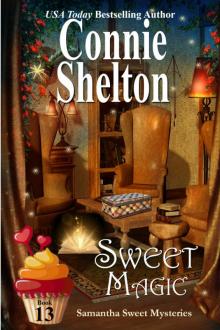 Sweet Magic
Sweet Magic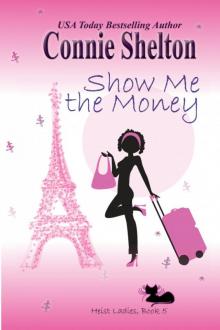 Show Me the Money
Show Me the Money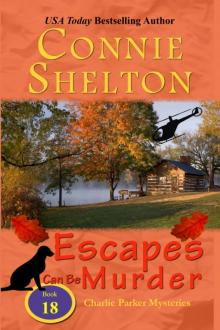 Escapes Can Be Murder
Escapes Can Be Murder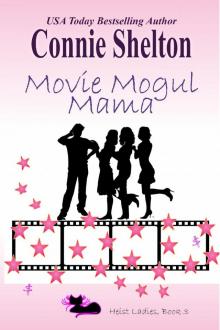 Movie Mogul Mama
Movie Mogul Mama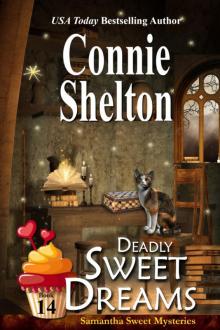 Deadly Sweet Dreams
Deadly Sweet Dreams Phantoms Can Be Murder: Charlie Parker Mystery #13 (The Charlie Parker Mystery Series)
Phantoms Can Be Murder: Charlie Parker Mystery #13 (The Charlie Parker Mystery Series)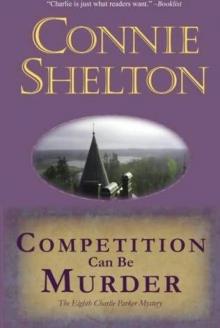 Competition Can Be Murder
Competition Can Be Murder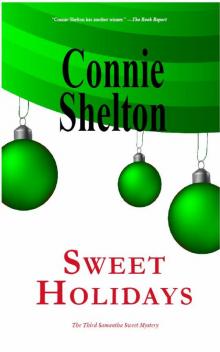 Sweet Holidays: The Third Samantha Sweet Mystery (The Samantha Sweet Mysteries)
Sweet Holidays: The Third Samantha Sweet Mystery (The Samantha Sweet Mysteries)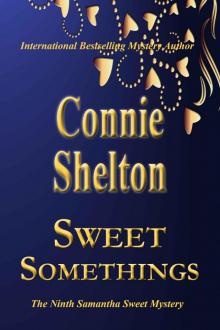 Sweet Somethings (Samantha Sweet Mysteries)
Sweet Somethings (Samantha Sweet Mysteries)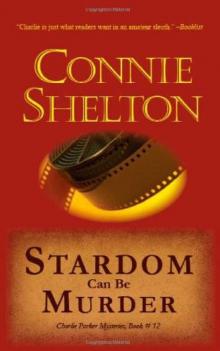 Stardom Can Be Murder: Charlie Parker Mystery #12
Stardom Can Be Murder: Charlie Parker Mystery #12 The Trophy Wife Exchange
The Trophy Wife Exchange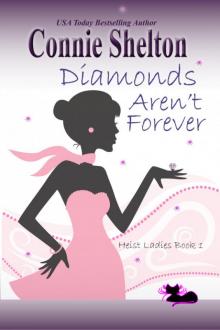 Diamonds Aren't Forever
Diamonds Aren't Forever Sweet Masterpiece
Sweet Masterpiece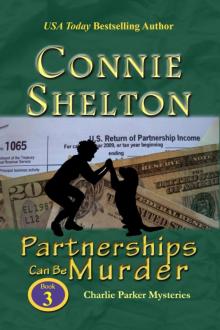 Partnerships Can Be Murder
Partnerships Can Be Murder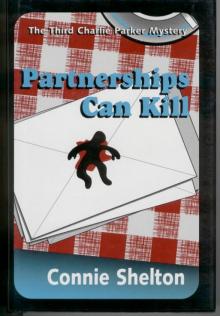 Partnerships Can Kill: The Third Charlie Parker Mystery
Partnerships Can Kill: The Third Charlie Parker Mystery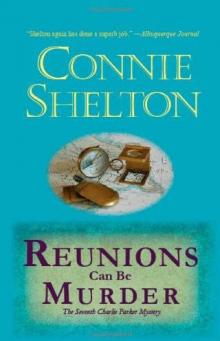 Reunions Can Be Murder: The Seventh Charlie Parker Mystery
Reunions Can Be Murder: The Seventh Charlie Parker Mystery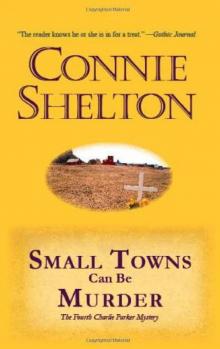 Small Towns Can Be Murder
Small Towns Can Be Murder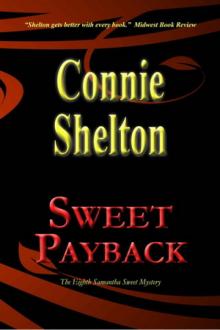 8 Sweet Payback
8 Sweet Payback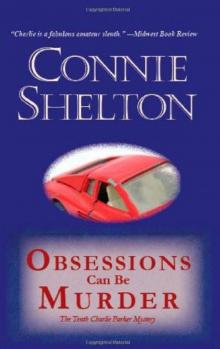 Obsessions Can Be Murder: The Tenth Charlie Parker Mystery
Obsessions Can Be Murder: The Tenth Charlie Parker Mystery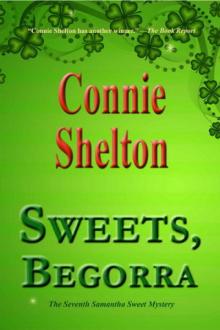 7 Sweets, Begorra
7 Sweets, Begorra Phantoms Can Be Murder: Charlie Parker Mystery #13
Phantoms Can Be Murder: Charlie Parker Mystery #13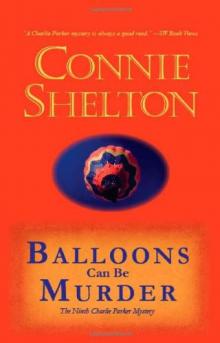 Balloons Can Be Murder: The Ninth Charlie Parker Mystery
Balloons Can Be Murder: The Ninth Charlie Parker Mystery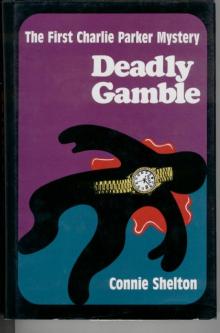 Deadly Gamble: The First Charlie Parker Mystery
Deadly Gamble: The First Charlie Parker Mystery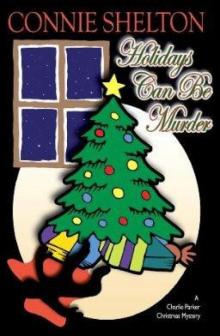 Holidays Can Be Murder: A Charlie Parker Christmas Mystery
Holidays Can Be Murder: A Charlie Parker Christmas Mystery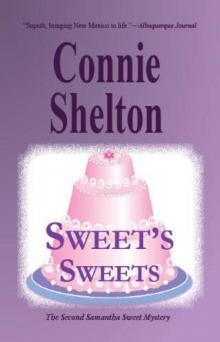 Sweet's Sweets: The Second Samantha Sweet Mystery ssm-2
Sweet's Sweets: The Second Samantha Sweet Mystery ssm-2 Sweet's Sweets: The Second Samantha Sweet Mystery (The Samantha Sweet Mysteries)
Sweet's Sweets: The Second Samantha Sweet Mystery (The Samantha Sweet Mysteries) Sweet Masterpiece - The First Samantha Sweet Mystery
Sweet Masterpiece - The First Samantha Sweet Mystery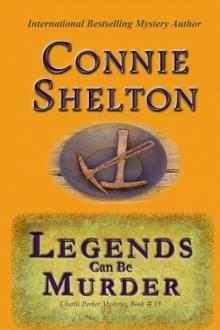 15 Legends Can Be Murder
15 Legends Can Be Murder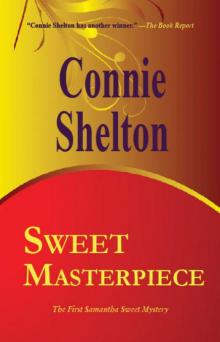 Sweet Masterpiece: The First Samantha Sweet Mystery ssm-1
Sweet Masterpiece: The First Samantha Sweet Mystery ssm-1 Sweets Forgotten (Samantha Sweet Mysteries Book 10)
Sweets Forgotten (Samantha Sweet Mysteries Book 10)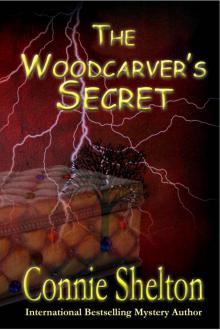 The Woodcarver's Secret (Samantha Sweet Mysteries)
The Woodcarver's Secret (Samantha Sweet Mysteries)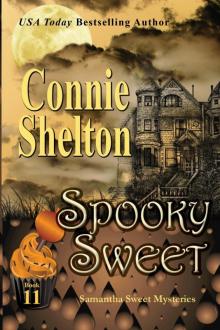 Spooky Sweet
Spooky Sweet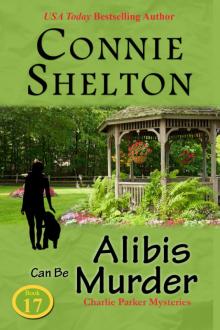 Alibis Can Be Murder
Alibis Can Be Murder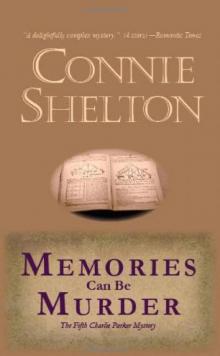 Memories Can Be Murder: The Fifth Charlie Parker Mystery
Memories Can Be Murder: The Fifth Charlie Parker Mystery Gossip Can Be Murder
Gossip Can Be Murder Honeymoons Can Be Murder: The Sixth Charlie Parker Mystery (The Charlie Parker Mysteries)
Honeymoons Can Be Murder: The Sixth Charlie Parker Mystery (The Charlie Parker Mysteries)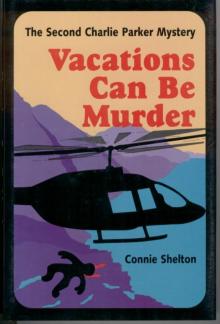 Vacations Can Be Murder: The Second Charlie Parker Mystery
Vacations Can Be Murder: The Second Charlie Parker Mystery Sticky Sweet
Sticky Sweet Sweet Hearts
Sweet Hearts